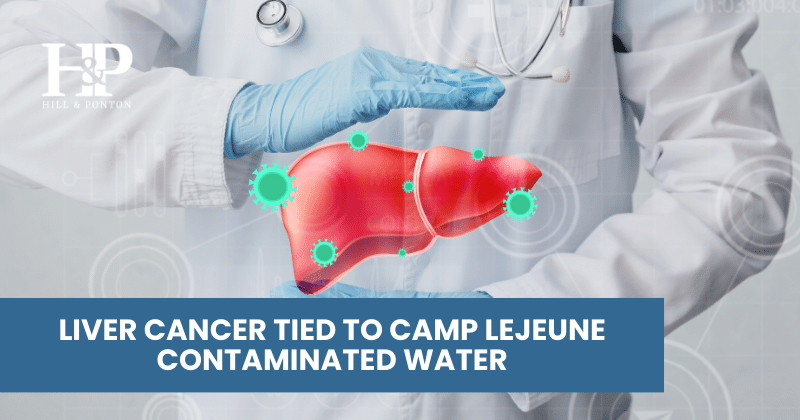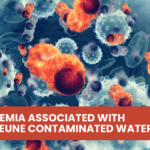For several decades, spanning from 1953 to 1987, a perilous hidden danger persisted at the U.S. Marine Corps Base Camp Lejeune in Jacksonville, North Carolina.
Oblivious to the perils, military service members, their families, and civilian workers were consuming and utilizing hazardous drinking water.
The aftermath of this exposure has reverberated with severe health complications, affecting countless lives even to this day.
Of the numerous health issues that have arisen from this tragic chapter, liver cancer has emerged as an especially concerning consequence.
Liver Cancer and Camp Lejeune
The story of Camp Lejeune isn’t just limited to its storied military accomplishments but also extends to a dark chapter involving grave health threats stemming from prolonged exposure to contaminated drinking water.
Subsequent studies and research efforts have drawn attention to the potential correlation between liver cancer and the toxic elements found in the water at Camp Lejeune.
The VA, in its comprehensive reports, has emphasized that individuals present at Camp Lejeune or MCAS New River from August 1953 through December 1987 are at a heightened risk due to this polluted water exposure.
As previously highlighted by the CDC, two dominant on-base water wells have been marked as the primary sources of this alarming contamination.
These wells were infamously riddled with a range of toxic substances:
- Trichloroethylene (TCE)
- Perchloroethylene (PCE)
- Trans-1
- Dichloroethylene (DCE)
- Benzene
- Vinyl chloride
Additional studies unveiled more harmful compounds, amplifying the depth of the contamination concerns.
By 1985, the extent of this contamination was unambiguously recognized, leading to the prompt shutdown of these compromised wells.
The contamination was eventually traced to a nearby off-base dry cleaning establishment.
Their flawed disposal mechanisms allowed these noxious chemicals to find their way into the base’s water supply, jeopardizing the health of a vast populace.
About Liver Cancer
Liver cancer is a formidable malignancy that begins in the cells of the liver.
While there are several types of tumors that can form in the liver, not all are cancerous.
The liver, being vital for filtering the blood, is susceptible to cancer from other parts of the body, making primary liver cancer cases rarer than secondary ones.
Various factors, including chronic infections, certain inherited diseases, and even exposure to harmful toxins like those at Camp Lejeune, can elevate the risk of developing liver cancer.
Recognizing the Symptoms of Liver Cancer
Early detection remains a cornerstone in the effective management of liver cancer.
Signs and symptoms to be vigilant about include:
- Sudden weight loss
- Persistent pain in the abdomen or near the right shoulder blade
- Swelling or bloating in the abdomen
- Nausea or vomiting
- General fatigue and weakness
- Yellow discoloration of the skin and eyes (jaundice)
- White, chalky stools
For those who had the misfortune of being at Camp Lejeune during the contamination years, heightened awareness of these symptoms and immediate medical consultation can pave the way for an early diagnosis, potentially improving treatment outcomes and prognosis.
Scientific Evidence Indicates a Link Between Contaminated Water Exposure at Camp Lejeune and Liver Cancer
A recent study of the contaminated water at Camp Lejeune and Marine Corps Air Station (MCAS) New River found that the contaminated water could cause primary hepatocellular carcinoma or cancer that originates in the liver, according to the National Cancer Institute.
It also causes fatty liver disease, which is similar to the damage caused by alcohol abuse.
Although medical literature from the Mayo Clinic provides evidence that suggests the liver is the only organ that can heal itself, over time, it becomes scarred and cirrhotic, losing its ability to generate new cells.
Epidemiological studies conducted by the CDC and ATSDR suggest that the high contaminants may have impacted as many as one million service members and their families with known health risks determined to have been in the water at Camp LeJeune between the 1950s and 1980s.
Scientific studies pointed to a strong association between those stationed at Camp Lejeune for longer periods and chronic illnesses or other serious health effects.
People with a year or more of exposure generally experienced the most significant impact.
Other health conditions and diseases that have been found to be linked to toxic substances in the water supply at Camp Lejeune include but are not limited to:
- Various types of cancer, including kidney cancer, breast cancer, bladder cancer, and esophageal cancer
- Congenital disabilities
- Myelodysplastic syndromes
- Acute myeloid leukemia
- Hepatic steatosis
- Female infertility
Individuals with conditions caused by drinking water contaminated by the above toxic chemicals often need ongoing medical services as they battle long-term illnesses caused by excessive solvent exposure.
Those exposed to these risk factors but have not yet developed diagnosable medical conditions are at a high risk of doing so.
Am I eligible for VA disability compensation?
You may be eligible for disability compensation payments on a presumptive basis if you meet all of these requirements.
These requirements apply to Veterans, Reservists, and National Guard members.
Both of these descriptions must be true:
- You served at Camp Lejeune or MCAS New River, North Carolina, for at least 30 days total between August 1, 1953, and December 31, 1987, and
- You didn’t receive a dishonorable discharge when you separated from the military
And you must have a diagnosis of 1 or more of these presumptive conditions:
- Adult leukemia
- Aplastic anemia and other myelodysplastic syndromes
- Bladder cancer
- Kidney cancer
- Liver cancer
- Multiple myeloma
- Non-Hodgkin’s lymphoma
- Parkinson’s disease
Evidence shows a link between these conditions and exposure to chemicals found in the drinking water at Camp Lejeune and MCAS New River during this time.
If you resided at Camp Lejeune or MCAS New River, North Carolina, you also may be able to participate in the class-action lawsuit under the Camp Lejeune Justice Act of 2022. For more information, please see our resource page about the lawsuit here.
Can I also get health care benefits?
Yes. If you meet the service requirements for Camp Lejeune, you may be eligible to enroll in VA health care.
If you have any of the 15 covered health conditions listed here, you won’t have to pay a copay for care for that condition.
Here are the 15 covered conditions related to Camp Lejeune:
- Bladder cancer
- Breast cancer
- Esophageal cancer
- Female infertility
- Hepatic steatosis
- Kidney cancer
- Leukemia
- Lung cancer
- Miscarriage
- Multiple myeloma
- Myelodysplastic syndromes
- Neurobehavioral effects
- Non-Hodgkin’s lymphoma
- Renal toxicity
- Scleroderma
Note: If you also get VA health care for other conditions that aren’t on this list, you may need to pay a copay for that care.
How Hill & Ponton is Committed to Supporting Affected Veterans
The tragic legacy of Camp Lejeune’s water contamination continues to impact countless lives.
However, with the right legal support, affected individuals can seek and secure the benefits they rightly deserve.
At Hill & Ponton, our primary mission is to advocate for veterans’ rights.
We specialize in VA disability benefits, striving tirelessly to navigate the intricate legal processes on behalf of those who served.
If you or a loved one have been affected by the Camp Lejeune water contamination, our team is here to guide you every step of the way.
Reach Out Today: You’ve served our country; now let us serve you.
Call Hill & Ponton at 1-888-477-2363 for professional assistance.
If you’ve been denied VA benefits and need help filing a claim, we’re here to support you.
Don’t delay—contact us and secure the compensation you deserve.
Click the button below to begin your free case evaluation.






